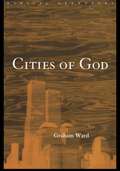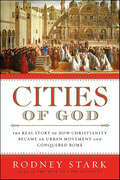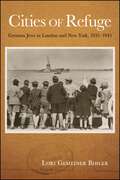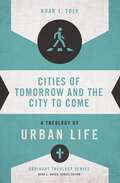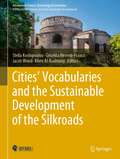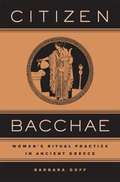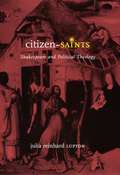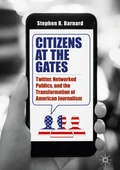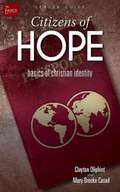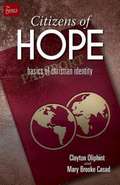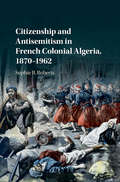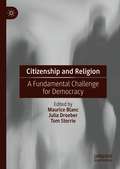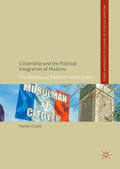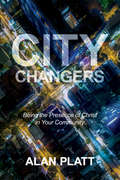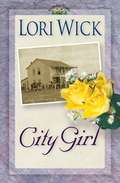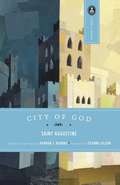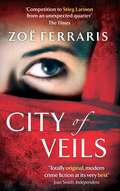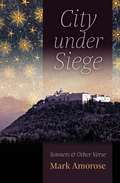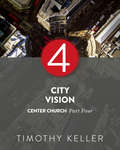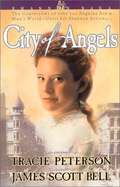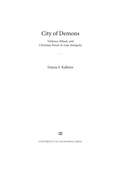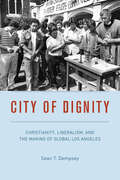- Table View
- List View
Cities in the Pre-Modern Islamic World: The Urban Impact of Religion, State and Society (SOAS/Routledge Studies on the Middle East #3)
by Amira K. Bennison Alison L. GascoigneThis volume is an inter-disciplinary endeavour which brings together recent research on aspects of urban life and structure by architectural and textual historians and archaeologists, engendering exciting new perspectives on urban life in the pre-modern Islamic world. Its objective is to move beyond the long-standing debate on whether an ‘Islamic city’ existed in the pre-modern era and focus instead upon the ways in which religion may (or may not) have influenced the physical structure of cities and the daily lives of their inhabitants. It approaches this topic from three different but inter-related perspectives: the genesis of ‘Islamic cities’ in fact and fiction; the impact of Muslim rulers upon urban planning and development; and the degree to which a religious ethos affected the provision of public services. Chronologically and geographically wide-ranging, the volume examines thought-provoking case studies from seventh-century Syria to seventeenth-century Mughal India by established and new scholars in the field, in addition to chapters on urban sites in Spain, Morocco, Egypt and Central Asia. Cities in the Pre-Modern Islamic World will be of considerable interest to academics and students working on the archaeology, history and urbanism of the Middle East as well as those with more general interests in urban archaeology and urbanism.
Cities of God
by David Gange Michael Ledger-LomasThe history of archaeology is generally told as the making of a secular discipline. In nineteenth-century Britain, however, archaeology was enmeshed with questions of biblical authority and so with religious as well as narrowly scholarly concerns. In unearthing the cities of the Eastern Mediterranean, travellers, archaeologists and their popularisers transformed thinking on the truth of Christianity and its place in modern cities. This happened at a time when anxieties over the unprecedented rate of urbanisation in Britain coincided with critical challenges to biblical truth. In this context, cities from Jerusalem to Rome became contested models for the adaptation of Christianity to modern urban life. Using sites from across the biblical world, this book evokes the appeal of the ancient city to diverse groups of British Protestants in their arguments with one another and with their secular and Catholic rivals about the vitality of their faith in urban Britain.
Cities of God (Routledge Radical Orthodoxy)
by Graham WardCities of God traces urban culture of north America and Western Europe during the 1970s, to ask how theology can respond to the postmodern city. Since Harvey Cox published his famous theological response to urban living during the mid-1960s very little has been written to address this fundamental subject. Through analyses of contemporary film, architecture, literature, and traditional theological resources in Augustine and Gregory of Nyssa, Graham Ward lays out a systematic theology which has the preparation and building of cities as its focus. This is vital reading for all those interested in theology and urban living.
Cities of God: The Real Story of How Christianity Became an Urban Movement and Conquered Rome
by Rodney StarkHow did the preaching of a peasant carpenter from Galilee spark a movement that would grow to include over two billion followers? Who listened to this "good news," and who ignored it? Where did Christianity spread, and how? Based on quantitative data and the latest scholarship, preeminent scholar and journalist Rodney Stark presents new and startling information about the rise of the early church, overturning many prevailing views of how Christianity grew through time to become the largest religion in the world.Drawing on both archaeological and historical evidence, Stark is able to provide hard statistical evidence on the religious life of the Roman Empire to discover the following facts that set conventional history on its head:Contrary to fictions such as The Da Vinci Code and the claims of some prominent scholars, Gnosticism was not a more sophisticated, more authentic form of Christianity, but really an unsuccessful effort to paganize Christianity.Paul was called the apostle to the Gentiles, but mostly he converted Jews.Paganism was not rapidly stamped out by state repression following the vision and conversion of the Roman Emperor Constantine in 312 AD, but gradually disappeared as people abandoned the temples in response to the superior appeal of Christianity.The "oriental" faiths—such as those devoted to Isis, the Egyptian goddess of love and magic, and to Cybele, the fertility goddess of Asia Minor—actually prepared the way for the rapid spread of Christianity across the Roman Empire.Contrary to generations of historians, the Roman mystery cult of Mithraism posed no challenge to Christianity to become the new faith of the empire— it allowed no female members and attracted only soldiers.By analyzing concrete data, Stark is able to challenge the conventional wisdom about early Christianity offering the clearest picture ever of how this religion grew from its humble beginnings into the faith of more than one-third of the earth's population.
Cities of Refuge: German Jews in London and New York, 1935-1945
by Lori Gemeiner BihlerIn the years following Hitler's rise to power, German Jews faced increasingly restrictive antisemitic laws, and many responded by fleeing to more tolerant countries. Cities of Refuge compares the experiences of Jewish refugees who immigrated to London and New York City by analyzing letters, diaries, newspapers, organizational documents, and oral histories. Lori Gemeiner Bihler examines institutions, neighborhoods, employment, language use, name changes, dress, family dynamics, and domestic life in these two cities to determine why immigrants in London adopted local customs more quickly than those in New York City, yet identified less as British than their counterparts in the United States did as American. By highlighting a disparity between integration and identity formation, Bihler challenges traditional theories of assimilation and provides a new framework for the study of refugees and migration.
Cities of Tomorrow and the City to Come: A Theology of Urban Life (Ordinary Theology)
by Gene L. Green Noah J. TolyEach day, the world’s urban population swells by almost 200,000. With every passing week, more than a million people new to cities face unexpected realities and challenges of urban life. Just like the sheer volume of people in the city, these challenges can be staggering. As with the height and breadth of our metropolises, the wonders of urban life can be breathtaking. Like the city itself, the questions and challenges of urban life are both sprawling and pulsing with vitality. As part of Zondervan's Ordinary Theology series, this volume offers a series of Christian reflections on some of the most basic and universal challenges of 21st century urban life. It takes one important dimension of what it means to be human—that human beings are made to be for God, for others, and for creation—and asks, “What are the implications of who God made us to be for how we ought to live in our cities?” This book is intended for Christians facing the riddle of urban creation care, discerning the shape of community life, struggling with the challenges of wealth and poverty, and wondering at the global influence of cities. It is meant for those whose lives and livelihoods are inextricably bound up in the flourishing of their neighborhood and also for those who live in the shadow of cities. Most of all, it is meant for those grappling with the relationship between the cities of tomorrow and the glorious city to come.
Cities’ Vocabularies and the Sustainable Development of the Silkroads (Advances in Science, Technology & Innovation)
by Kheir Al-Kodmany Stella Kostopoulou Jacob Wood Gricelda Herrera-FrancoThis book discusses how cities’ identities are formed and developed over time and portrays architecture and the arts as the embodiment of the historical, cultural, and economic characteristics of cities. Furthermore, it explores strategies and solutions to preserve the cultural heritage along the Silk Road, representing a compilation of research addressing the economic and social opportunities and challenges related to the development of a more sustainable and responsible approach to tourism development and the preservation of heritage. As such, it covers a wide range of audiences including economists, architects, planners, tourism experts, and decision-makers interested in making use of cities' available resources and features, offering strategies to explore development opportunities through sustainable and responsible tourism along the Silk Road. This book is a culmination of selected research papers from the first version of the International Conference on "Silk Road Sustainable Tourism Development and Cultural Heritage (SRSTDCH)" which was held in 2021 in collaboration with Aristotle University of Thessaloniki, the European Interdisciplinary Silk Road Tourism Centre, Greece and the 5th Edition of the International Conference on “Cities’ Identity Through Architecture and Arts (CITAA)” which was held in 2021 in collaboration with University of Pisa, Italy.
Citizen Bacchae: Women's Ritual Practice in Ancient Greece
by Barbara GoffThis book offers answers what activities did the women of ancient Greece perform in the sphere of ritual, and the meanings of such activities for them and their culture. It aims to recover and reconstruct an important dimension of the lived experience of ancient Greek women. It draws on a wide range of evidence from across the Greek world, including literary and historical texts, inscriptions, and vase-paintings, to assemble a portrait of women as religious and cultural agents.
Citizen-Saints: Shakespeare and Political Theology
by Julia Reinhard LuptonTurning to the potent idea of political theology to recover the strange mix of political and religious thinking during the Renaissance, this bracing study reveals in the works of Shakespeare and his sources the figure of the citizen-saint, who represents at once divine messenger and civil servant, both norm and exception. Embodied by such diverse personages as Antigone, Paul, Barabbas, Shylock, Othello, Caliban, Isabella, and Samson, the citizen-saint is a sacrificial figure: a model of moral and aesthetic extremity who inspires new regimes of citizenship with his or her death and martyrdom. Among the many questions Julia Reinhard Lupton attempts to answer under the rubric of the citizen-saint are: how did states of emergency, acts of sovereign exception, and Messianic anticipations lead to new forms of religious and political law? What styles of universality were implied by the abject state of the pure creature, at sea in a creation abandoned by its creator? And how did circumcision operate as both a marker of ethnicity and a means of conversion and civic naturalization? Written with clarity and grace, Citizen-Saints will be of enormous interest to students of English literature, religion, and early modern culture.
Citizens at the Gates: Twitter, Networked Publics, and the Transformation of American Journalism
by Stephen R. BarnardDrawing insights from nearly a decade of mixed-method research, Stephen R. Barnard analyzes Twitter’s role in the transformation of American journalism. As the work of media professionals grows increasingly hybrid, Twitter has become an essential space where information is shared, reporting methods tested, and power contested. In addition to spelling opportunity for citizen media activism, the normalization of digital communication adds new channels of influence for traditional thought leaders, posing notable challenges for the future of journalism and democracy. In his analyses of Twitter practices around newsworthy events—including the Boston Marathon bombing, protests in Ferguson, Missouri, and the election of Donald Trump—Barnard brings together conceptual and theoretical lenses from multiple academic disciplines, bridging sociology, journalism, communication, media studies, science and technology studies, and political science.
Citizens of Hope Leader Guide: Basics of Christian Identity (The Basics)
by Clayton Oliphint Mary Brooke CasadHope is central to our identity as Christians. Just as our bodies need food, our souls need hope, and the supreme hope is found in a relationship with Jesus Christ. How does that relationship become real to us? In this book and 4-week study, readers are guided on a formative path of understanding who God is and who they are as God’s children. This Leader Guide includes everything a group leader needs to plan and facilitate the four sessions, helping participants to explore what they have read and to discuss the reading with the group. The guide walks leaders through the study format and provides options for tailoring sessions to the time-frame and style of each group. Citizens of Hope is part of The Basics Series.
Citizens of Hope: Basics of Christian Identity (The Basics)
by Clayton Oliphint Mary Brooke CasadHope is central to our identity as Christians. Just as our bodies need food, our souls need hope, and the supreme hope is found in a relationship with Jesus Christ. How does that relationship become real to us? In this book and 4-week study, readers are guided on a formative path of understanding who God is and who they are as God’s children. Citizens of Hope is part of The Basics Series. An invitation into a more faithful and profound understanding of Christian hope. An excellent resource for small groups, Sunday school, individual meditation, and both new and maturing disciples of Jesus. —Janice Riggle Huie, Bishop of the Texas Conference of The United Methodist Church A hope-filled description of what it means to be followers of Jesus Christ and a reminder of how God is at work in every aspect of our Christian journey. I commend this book to individuals and groups seeking to know how to walk as a citizen of hope in our Twenty-first-century world.—Amy Valdez Barker, Executive Secretary, Connectional Table of The United Methodist Church
Citizenship and Antisemitism in French Colonial Algeria, 1870–1962
by Sophie B. RobertsProfessor Roberts examines the relationship between antisemitism and the practices of citizenship in a colonial context. She focuses on the experience of Algerian Jews and their evolving identity as citizens as they competed with the other populations in the colony, including newly naturalised non-French settlers and Algerian Muslims, for control over the scarce resources of the colonial state. The author argues that this resulted in antisemitic violence and hotly contested debates over the nature of French identity and rights of citizenship. Tracing the ambiguities and tensions that Algerian Jews faced, the book shows that antisemitism was not coherent or stable but changed in response to influences within Algeria, and from metropolitan France, Europe and the Middle East. Written for a wide audience, this title contributes to several fields including Jewish history, colonial and empire studies, antisemitism within municipal politics, and citizenship, and adds to current debates on transnationalism and globalization.
Citizenship and Religion: A Fundamental Challenge for Democracy
by Julia Droeber Maurice Blanc Tom StorrieThis book explores the relationship between religion and citizenship from a culturally diverse group of contributors, in the context of the developing tendency towards fundamentalist and conflicting religious beliefs in European, North African, and Middle Eastern societies. The chapters provide an alternative narrative of the role of religion, presenting diverse ‘lived shades’ of citizenship, as well as accounting for issues of gender equality, minority rights, violence, identity, education, and secularisation. As the renewed role of religious institutions is increasing in Europe and elsewhere, the contributors interrogate the experience of belonging, public policy, welfare services and religious education, highlighting how cooperation between citizenship and religion is necessary in a democratic regime. The research will be of interest to students and scholars across sociology, international relations, and religious studies.
Citizenship and the Political Integration of Muslims: The Relational Field of French Islam (Palgrave Politics of Identity and Citizenship Series)
by Manlio CinalliThis book explores the political integration of Muslims and Islam across contemporary democracies. The author focuses on France, a country in which the integration of Muslims is usually seen as being problematic and controversial, and which is struggling with both Islamic radicalisation on the one hand, and the new wave of extreme-right populism on the other. Whereas conventional approaches to the topic of the integration of Muslims in France have tended to focus on single methods and sources, such as demographic characteristics or cultural and economic resources, the 'field mixed-method approach' offered in this book allows for a more nuanced analysis. It sheds new light on the interactive dynamics between policy processes, the role of key meso-level actors such as movements and associations, and the political entrepreneurship of Muslims themselves within the overarching frame of French citizenship. The book thus assesses the extent to which a broad set of interactions link Muslim French to the broader community of French citizens. It will be of interest to scholars and students with an interest in Political Sociology, Islamic Studies, Citizenship and European Politics.
City Changers: Being the Presence of Christ in Your Community
by Alan PlattThe Bible is clear about God’s love for the city, be it Babylon, Nineveh, or Jerusalem. Thousands of years later, that love hasn’t changed—and God still calls His people to speak truth to the cities of the world. In City Changers, Alan Platt gives theological clarity as well as practical answers and inspiration for influencing the spiritual, social, and cultural dimensions of readers’ communities. Platt himself has seen the power of the church transform cities from South Africa to South Florida. As he shows through his remarkable stories, the future of God’s church depends on Christ followers willing to be instruments of change for the sake of God’s kingdom.
City Girl (The Yellow Rose Trilogy #3)
by Lori WickReagan knows her way around 19th-century New York City---but nothing back East has prepared her for the land of armadillos and God-fearing Texans! When rancher Cash Rawlings comes into her life, she's intrigued by his gentle, prayerful ways---but could she ever share his faith---or his life? 278 pages, softcover from Harvest.
City Of God
by St. AugustineNo book except the Bible itself had a greater influence on the Middle Ages than City of God. Since medieval Europe was the cradle of today's Western civilization, this work by consequence is vital for understanding our world and how it came into being. Saint Augustine is often regardarded as the most influential Christian thinker after Saint Paul, and City of God is his materpiece, a cast synthesis of religious and secular knowledge. It began as a reply to the charge that Christian otherworldiness was causing the decline of the Roman Empire. Augustine produced a wealth of evidence to prove that paganism bore within itself the seeds of its own destruction. Then he proceeded to his larger theme, a cosmic interpretation of in terms of the struggle between good and evilL the City of God in conflict with the Earthly City or the City of the Devil. This, the first serious attempt at a philosophy of history, was to have incalculable influence in forming the Western mind on the relations of church and state, and on the Christian's place in the temporal order. The original City of God contained twenty-two books and filles three regular-sized volumes. This edition has been skillfully abridged for the intelligent general reader by Vernon J. Bourke, author of Augustine's Quest for Wisdom, making the heart of this monumental work available to a wide audience.
City Of Veils: A Novel (A\katya Hijazi And Nayir Sharqi Novel Ser.)
by Zoe FerrarisThe crime: one scalding afternoon, the mutilated body of a young woman, half naked beneath her burqa, is discovered on a Saudi beach; soon afterwards a Western woman's husband vanishes without trace.The place: Jeddah, Saudi Arabia, the City of Veils. A city of narrow streets and closed shutters, where nothing is what it seems ;and the Empty Quarter - one of the most beautiful, yet unforgiving deserts on earth.The people: Miriam Walker, alone in an alien culture, desperate to find her missing husband. Katya, a forensic scientist battling the prejudices of a society full of sexual, religious and moral contradictions; and Nayir, devout Muslim, desert guide, amateur sleuth - the man she loves.
City Under Siege: Sonnets and Other Verse
by Mark AmoroseIn City under Siege, poet Mark Amorose ranges widely across Western history. In poem after poem of elegant formality, the reader is taken on a journey from the pre-Christian world through biblical times, on to the high noon of medieval Christendom, and finally, through a flawed Reformation, Enlightenment, and Romanticism, to the spiritual wastelands of modernity. Amorose praises creation, the Catholic Church, Mary, angels, saints, and martyrs; he condemns reductive scientism, soulless commercialism, and self-serving relativism. City under Siege is an heroic defense of the City of God, a city now under siege, yet against which, in the end, no force can ever prevail.
City Vision: Center Church, Part Four
by Timothy KellerFruitful ministry in the century must embrace the unavoidable reality of the city. A Center Church theological vision affirms that center cities are wonderful, strategic, and underserved places for gospel ministry and recognizes that virtually all ministry contexts are increasingly shared by urban and global forces. Regardless of your particular cultural or geographical context, you will need to consider the city when forming a theological vision that engages the people you are trying to reach. Churches and ministries that flourish in urban and cultural centers are marked by what we call “city vision.” This eBook contains the fourth part of Center Church, “City Vision.” In it, Keller examines the characteristics that mark churches and ministries that flourish in urban and cultural centers. He examines the key characteristics of city vision that are based in an understanding of how the city develops as a theme throughout Scripture, from its anti-God origins, to its strategic importance for mission, to its culmination and redemption in glory. Most important, a city vision will give us a genuine love for the place we are called to reach with the gospel, rather than hostility or indifference toward it.
City of Angels (Shannon Saga #1)
by Tracie Peterson James S. BellWith Shoulders squared and dreams set high, Kit Shannon arrives in LA feeling a special calling to practice law. Under the care of her social light aunt Kit quickly comes to realize that few understand her burning desire to seek justice for the poor and oppressed. Kit finds herself under the mentorship the city's most prominent trial lawyer and a new world of opportunity is open to her. Drawn into a high profile case Kit's longs to discover the truth but struggles with personal doubts about the suspect she must defend.
City of Demons
by Dayna S. KalleresAlthough it would appear in studies of late antique ecclesiastical authority and power that scholars have covered everything, an important aspect of the urban bishop has long been neglected: his role as demonologist and exorcist. When the emperor Constantine made Christianity the official religion of the realm, bishops and priests everywhere struggled to "Christianize" the urban spaces still dominated by Greco-Roman monuments and festivals. During this period of upheaval, when congregants seemingly attended everything but their own "orthodox" church, many ecclesiastical leaders began simultaneously to promote aggressive and insidious depictions of the demonic. In City of Demons, Dayna S. Kalleres investigates this developing discourse and the church-sponsored rituals that went along with it, showing how shifting ecclesiastical demonologies and evolving practices of exorcism profoundly shaped Christian life in the fourth century.
City of Dignity: Christianity, Liberalism, and the Making of Global Los Angeles (Historical Studies of Urban America)
by Sean T. DempseyCity of Dignity illuminates how liberal Protestants quietly, yet indelibly, shaped the progressive ethics of postwar Los Angeles. Contemporary Los Angeles is commonly seen as an American bulwark of progressive secular politics, a place that values immigration, equity, diversity, and human rights. But what accounts for the city’s embrace of such staunchly liberal values, which are more hotly contested in other parts of the country? The answer, Sean Dempsey reveals, lies not with those frequent targets of credit and blame—Democrats in Hollywood—but instead with liberal Protestants and other steadfast religious organizations of the postwar era. As the Religious Right movement emerged in the 1970s, progressive religious activists quietly began promoting an ethical vision that made waves worldwide but saw the largest impact in its place of origin: metropolitan Los Angeles. At the center of this vision lay the concept of human dignity—entwining the integral importance of political and expressive freedom with the moral sanctity of the human condition—which suffused all of the political values that arose from it, whether tolerance, diversity, or equality of opportunity. The work of these religious organizations birthed such phenomena as the Sanctuary Movement—which provided safe haven for refugees fleeing conflict-torn Central America—and advocacy for the homeless, both of which became increasingly fraught issues amid the rising tides of neoliberalism and conservatism. City of Dignity explores how these interwoven spiritual and theological strands found common ground—and made common impacts—in the humanitarian ecosystem of one of America’s largest and most dynamic metro areas.
City of Dignity: Christianity, Liberalism, and the Making of Global Los Angeles (Historical Studies of Urban America)
by Sean T. DempseyCity of Dignity illuminates how liberal Protestants quietly, yet indelibly, shaped the progressive ethics of postwar Los Angeles. Contemporary Los Angeles is commonly seen as an American bulwark of progressive secular politics, a place that values immigration, equity, diversity, and human rights. But what accounts for the city’s embrace of such staunchly liberal values, which are more hotly contested in other parts of the country? The answer, Sean Dempsey reveals, lies not with those frequent targets of credit and blame—Democrats in Hollywood—but instead with liberal Protestants and other steadfast religious organizations of the postwar era. As the Religious Right movement emerged in the 1970s, progressive religious activists quietly began promoting an ethical vision that made waves worldwide but saw the largest impact in its place of origin: metropolitan Los Angeles. At the center of this vision lay the concept of human dignity—entwining the integral importance of political and expressive freedom with the moral sanctity of the human condition—which suffused all of the political values that arose from it, whether tolerance, diversity, or equality of opportunity. The work of these religious organizations birthed such phenomena as the Sanctuary Movement—which provided safe haven for refugees fleeing conflict-torn Central America—and advocacy for the homeless, both of which became increasingly fraught issues amid the rising tides of neoliberalism and conservatism. City of Dignity explores how these interwoven spiritual and theological strands found common ground—and made common impacts—in the humanitarian ecosystem of one of America’s largest and most dynamic metro areas.


